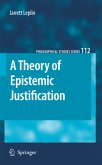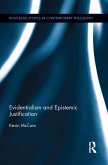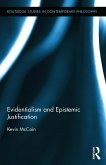Against various detractors (e.g. Wilfred Sellars, Donald Davidson, etc.), this book develops a foundationalist theory of epistemic justification. In contrast with Laurence BonJour and borrowing from John McDowell, the essential argument is that conceptualized perpetual experience provides a non-doxastic foundation for perceptual beliefs about physical objects.
Hinweis: Dieser Artikel kann nur an eine deutsche Lieferadresse ausgeliefert werden.
Hinweis: Dieser Artikel kann nur an eine deutsche Lieferadresse ausgeliefert werden.
In this book, Porter demonstrates that he is a talented philosopher with much that is unique to contribute to the field of philosophy, and in an area so fundamental that it concerns the practice of all the disciplines within the academy. Porter's ability to explain difficult and subtle points in epistemology at a level accessible to non-specialists is demonstrated here. The book responds carefully to influential recent developments on this topic, as seen in large sections devoted to discussion of such figures as Sellars, BonJour, Davidson, and McDowell. These are treacherous waters, where there is much opportunity for things to go wrong. Porter navigates them well with a well-organized monograph, thoughtful reflection on a host of thorny issues, and bold and innovative work on a feature of central importance (non-inferential, non-constructive conceptualization of experience that can ground basic empirical beliefs). -- R. Douglas Geivett, Biola University RESTORING THE FOUNDATIONS OF EPISTEMIC JUSTIFICATION is a first rate contribution to understanding the unsolved problem that stands at the core of Modern thought: The mind's access to a world it does not create. Its discussion of Direct Realism is invaluable-the best in the current literature. This is also true of the discussion of the relationships between concepts and the world-especially the critique of McDowell. Its analyses of the central issues facing Realism, and of the main authors in this field, are clear, thorough and incisive. As a text for advanced courses in the Theory of Knowledge, as well as an essay to be studied in front-line research, this book is uniquely valuable. It is a major contribution... -- Dallas Willard, University of Southern California There has been a striking resurgence of interest in foundationalist theories of epistemic justification in recent years, after foundationalism had been given up for dead by most philosophers. This book is a valuable contribution to this renewed discussion. It offers an original version of foundationalism that relies on an internalist conception of epistemic justifcationm a direct realist theory of perception, and a theory of concepts that is specifically designed to make use of the epistemic advantages of direct realism. The theory here developed is particularly sensitive to the need to explain how our perceptual experiences can justify the ordinary propositions we claim to know in such a way that the epistemic status of those experiences does not itself require independent justifcation...The clarity of the writing makes the book accessible not just to philosophers engaged in research in this but also to graduate students and upper-level undergraduates. -- Timm Triplett, University of New Hampshire RESTORING THE FOUNDATIONS OF EPISTEMIC JUSTIFICATION is a first rate contribution to understanding the unsolved problem that stands at the core of Modern thought: The mind's access to a world it does not create. Its discussion of Direct Realism is invaluable-the best in the current literature. This is also true of the discussion of the relationships between concepts and the world-especially the critique of McDowell. Its analyses of the central issues facing Realism, and of the main authors in this field, are clear, thorough and incisive. As a text for advanced courses in the Theory of Knowledge, as well as an essay to be studied in front-line research, this book is uniquely valuable. It is a major contribution. -- Dallas Willard, University of Southern California








